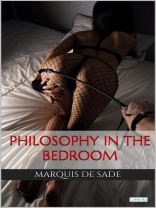Marquis de Sade needs no introduction: He was libertine, irreverent, cruel, and, through his deeds and writings, the reason and origin of the term sadism. ‘Philosophy in the Bedroom’ is a work by Marquis de Sade relatively ‘light’ compared to his other works, such as ‘The 120 Days of Sodom, ‘ for example. Here, the libertine Marquis even indulges in philosophizing about issues like religion and customs amidst one orgy and another. But let the reader not be mistaken: when it comes to Sade, even the slightest is shocking. In ‘Philosophy in the Bedroom, ‘ Madame de Saint-Ange requests a certain banker to send his 15-year-old daughter to her house for a few days so that she can be initiated into the world of libertinism, and what follows are the theoretical and practical lessons taught by a select and devoted group of libertines.
Tentang Penulis
Marquis de Sade (1740-1814) was a French writer and philosopher known for his controversial literary works and radical exploration of freedom, morality, and human nature. His name gave rise to the term ‘sadism, ‘ due to the themes of violence, power, and eroticism prevalent in his writings. Born in Paris, Sade became an emblematic figure of the late Enlightenment, although his ideas and style clashed with the traditional values of his time, provoking both admiration and outrage.
Sade’s work delves into the extremes of human nature and the boundaries of morality. Among his most notable writings are Justine, or The Misfortunes of Virtue (1791) and The 120 Days of Sodom (written in 1785 but published posthumously). These texts combine philosophical and narrative elements to analyze the interplay between power, desire, and cruelty, challenging traditional conceptions of good and evil.
Despite severe censorship and criticism during his lifetime, Marquis de Sade left an indelible mark on literature and philosophy. His work influenced thinkers such as Georges Bataille and Michel Foucault, who examined his ideas within the context of power and transgression. Moreover, his bold and provocative style anticipated elements of surrealism and existentialism.












